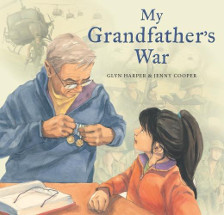My grandfather's war by Glynn Harper

Ill. by Jenny Cooper. EK Books, 2018. ISBN 9781775592990
My grandfather's war tells us of a more recent conflict, the Vietnam
War, a war where those who served are now the grandparents of its
target audience, our primary school students.
At a time when the world had almost emerged into a new era following
World War II, the USA and the USSR were the new superpowers and the
common catch-cry promoted by prime ministers and politicians was
"All the way with LBJ", Australian and New Zealand joined forces
with the USA in this new conflict to stop the "Yellow Peril" of
China moving south and overtaking nations just as Japan had tried to
do between 1941 and 1945. Among the 65 000 troops of both nations
committed between 1963 and 1975 was Robert, Sarah's grandfather who
now lives with her family and who is "sometimes very sad."
Possibly a natio, drafted because a marble with his birthdate on it
dropped into a bucket, old enough to die for his country but too
young to vote for those who sent him, Robert, like so many others of
his age whose fathers and grandfathers had served, thought that this
was his turn and his duty and that the war "would be exciting". But
this was a war unlike those fought by the conservative, traditional
decision-makers - this was one fought in jungles and villages where
the enemy could be anywhere and anyone; one where chemicals were
used almost as much as bullets; one where the soldiers were not
welcomed as liberators but as invaders; and one which the soldiers
themselves knew they could not win. It was also the first war that
was taken directly into the lounge rooms of those at home as
television became more widespread, affordable and accessible.
And the reality of the images shown clashed with the ideality of
those watching them, a "make-love-not-war" generation who, naive to
the ways of politics and its big-picture perspective of power and
prestige, were more concerned for the individual civilians whose
lives were being destroyed and demanded that the troops be
withdrawn. Huge marches were held throughout the USA, New Zealand
and Australia and politicians, recognising that the protesters were
old enough to vote and held their futures in their hands, began the
withdrawal.
But this was not the triumphant homecoming like those of the
servicemen before them. Robert came home to a hostile nation who
held him and his fellow soldiers personally responsible for the
atrocities they had seen on their screens. There were no welcome
home marches, no public thanks, no acknowledgement of heroes and
heroism, and Robert, like so many of those he fought with, slipped
back into society almost as though he was in disgrace. While the
official statistics record 578 killed and 3187 wounded across the
two countries, the stats for those who continued to suffer from
their physical and mental wounds and those who died because of them,
often at their own hands, are much more difficult to discover. Like
most returned servicemen, Robert did not talk about his experiences,
not wanting to inflict the horror on his family and friends and
believing that unless you were there you wouldn't understand; and
without the acknowledgement and support of the nation he was
supposedly saving and seeing his mates continue to battle the impact
of both the conflict and the chemicals, he sank into that deep
depression that Sarah sees as his sadness but which is now known as
post-traumatic stress disorder (PTSD).
Disturbed by his sadness but told never to talk to her grandfather
about the war, Sarah is curious and turns to the library for help.
But with her questions unanswered there, she finally plucks up the
courage to ask him and then she learns Grandad's story - a story
that could be told to our students by any number of grandfathers,
and one that will raise so many memories as the 50th anniversary of
the Battle of Khe Sanh approaches, and perhaps prompt other Sarahs
to talk to their grandfathers.
Few picture books about the Vietnam War have been written for young
readers, and yet it is a period of our history that is perhaps
having the greatest impact on our nation and its families in current
times. Apart from the personal impact on families as grandfathers,
particularly, continue to struggle with their demons, it opened the
gates to Asian immigration in an unprecedented way, changing and
shaping our nation permanently.
Together, Harper and Cooper have created a sensitive, personal and
accessible story that needs to be shared, its origins explored and
understanding generated.
Lest We Forget.
Barbara Braxton